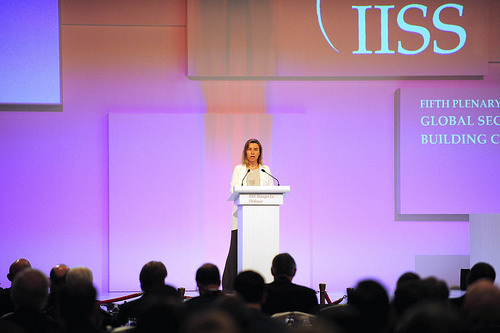
Shangri La Dialogue 2015: Europe was there

In
The EU took a (generally) pragmatic approach to relations with Asia at the recent high-level security conference in Singapore.
This article has been published on The Diplomat.
(Photo credit: EEAS, Flickr)
*****
Shangri La Dialogue 2015: Europe was there
The EU took a (generally) pragmatic approach to relations with Asia at the recent conference.
Federica Mogherini, the senior European Union representative on foreign policy, has more than earned her t-shirt “I was at the Shangri La Dialogue 2015,” the 14th edition of the annual high-level conference on Asian security in Singapore, organized by the International Institute for Strategic Studies (IISS). Unlike last year, there was no public showdown at the conference. Yet beneath the conciliatory tone one could sense the brewing tension, notably about the maritime disputes in the region, especially the South China Sea. The European voice adopted a much more pragmatic tone than previously.
“[O]ur engagement with Asia goes well beyond trade, investment and aid. It is political, it is strategical and it needs to develop more also in the security field.” Mogherini clearly positioned the EU as a strategic actor, not just in its own region but across the globe. She was careful however to formulate an offer of support rather than presenting the Asian participants with a fait accompli of EU involvement. Significant EU expertise and assistance is on offer on many issues of common interest, from maritime security to terrorism and radicalization – if the Asian countries wish to deepen their partnership.
There are enough actors jockeying for position already, in the South China Sea and elsewhere in the region. The EU need not join the fray the way that others do, but is ideally placed to demonstrate that a different way of doing foreign policy and ensuring security is possible: emphasizing conflict prevention, working through multilateral channels, in a comprehensive manner integrating diplomacy, aid and trade, and defence. Mogherini pointed out that it is not because one chooses not to play traditional power politics that one ignores security.
She was supported by German Defence Minister Ursula von der Leyen, who referred to the German and European experience: “We partly gave up national sovereignty but we gained way more political and economic power for that.” An inspiration for ASEAN, perhaps, which shares the same spirit as the EU in trying to establish a community in which war among its members becomes unimaginable.
Unfortunately not all European speakers were on the same line. British Secretary for Defence Michael Fallon spoke of the U.K. as a global actor, mentioned NATO and the UN, but only made a vague reference to the EU in reply to a specific question from the floor. The French Minister of Defence had cancelled his participation, but a French diplomat (impelled by Fallon probably) made sure France’s bases and naval deployments did not go unmentioned. Statements like this betray a poor understanding of power relations in the region. For sure, Britain and France have much more military clout than any other EU member state and are, with Germany, arms providers to the region. But they can no longer play a significant role on their own. Seen from the U.S. and Asia alike, the presence of the odd British or French ship does not make any military difference: The 7th Fleet doesn’t need reinforcement.
Mogherini made clear that the EU seeks to contribute to a stronger but different diplomatic and security engagement, focusing on confidence building measures, exchange of expertise, and common exercises as well as economic investment. All of these require the collective weight of the EU if Europeans want to exert any influence. Strategic engagement requires critical mass.
What could the EU bring to the region? Investment seems an obvious area, but in fact several countries in the region have the impression that China’s massive economic presence is crowding out other actors, leaving them more dependent on Beijing than some would desire. The EU could assess in which countries and in which sectors investment can create a win-win situation and step up its presence. ASEAN is the evident partner in this regard.
Indeed, Mogherini and the Commission had just released a new communication: “The EU and ASEAN: a partnership with a strategic purpose.” Rather than deploying ships, dealing effectively with issues such as port security, container safety, transnational crime and smuggling, and disaster management will contribute in a very concrete way to security. Existing expert consultations on human trafficking could be expanded to migration; narcotics and money-laundering are subjects for technical dialogue. With regard to the maritime disputes, the ASEAN-EU High Level Dialogue on Maritime Security Cooperation (the second dialogue was held in May 2015 in Kuala-Lumpur) should be the starting point for concrete joint projects like training courses. Practical cooperation, clear priorities, benchmarks, and regular assessment will be important to make the Communication more than just another piece of paper.
Finally, what many countries in the region find more alarming than the maritime disputes, is terrorism and radicalization. Because these areas are two pressing transnational threats in both Europe and Asia, with proven links between them, cooperation will not only have implications on the EU-ASEAN partnership but on each region’s security.
Sven Biscop (Egmont Institute, Brussels), Sophie Boisseau du Rocher (Centre asie IFRI, Paris), Gudrun Wacker (SWP, Berlin)